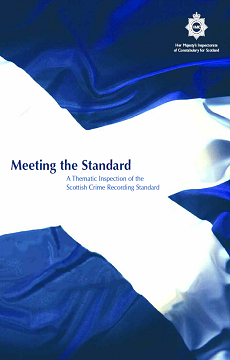Scottish forces introduced a new policy of crime recording in April 2004. The Scottish Crime Recording Standard (SCRS) was established by the Association of Chief Police Officers in Scotland (ACPOS) to address previously identified deficiencies in crime recording practices highlighted in reports by HMIC and Audit Scotland and in the Scottish Crime Survey.
This report is the result of a thematic inspection of the Scottish Crime Recording Standard.
Number | Recommendation |
|---|---|
1 | Force lead officers utilise this report to reaffirm their commitment to the SCRS and stress its importance to all staff in a manner which seeks to sustain its impact. |
2 | ACPOS, drawing on the experience of the Scottish Crime Registrars Group, engages with the Scottish Police College with a view to introducing a standardised approach to training, recognising the different needs of operational officers and support staff, probationers, first line managers, Force Crime Registrars and their Deputies. |
3 | ACPOS considers the requirements of the SCRS in the light of prioritisation of IT development within the SPIS programme. |
4 | The responsibilities of the Force Crime Registrar (FCR) should be clearly separated from those relating to detections or managing volume crime. |
5 | Forces appoint a Deputy Crime Registrar with sufficient authority to act in the absence of the FCR. The Deputy should be trained to the same standard as the FCR and be able to make decisions on behalf of the force. |
6 | Each force undertakes to ensure its FCR or Deputy Registrar attends at every meeting of the Scottish Crime Registrars Group to achieve uniformity in the application of the SCRS at this critical time in its implementation. |
7 | Forces carry out at a local level a dip sample of incidents initially coded as a crime, but disposed of as non crime, to confirm correct application of the Standard by way of a telephone based customer survey. |
8 | The Scottish Crime Registrars Group formalises a standard auditing procedure and ensures its use in all Scottish forces in both a central and local audit. Sufficient training must be conducted for those carrying out the audit to ensure a Scotland wide consistency in its application. |
9 | Forces identify a centrally-based supervisor at area command level to have responsibility for all no crime decisions in the area. The no crime decisions should be overseen by the FCR who should maintain an overview of all decisions taken and act as final arbiter in areas of dispute. |
10 | Forces examine a sample of lost property reports at regular intervals to check that crimes are not being incorrectly recorded as lost property. |
11 | ACPOS engages with the Scottish Executive to assess the suitability of publishing a subcategory of unco-operative complainers in statistical returns in relation to Group 1 and 2 crimes. |
12 | ACPOS engages with the Scottish Executive and Crown Office in pursuing a clearer definition of serious assault to standardise the classification and recording of this crime within Scottish forces. |
13 | ACPOS considers the introduction of a policy that makes provision for the noninvestigation of crime based on the wishes of the complainer balanced with public safety and public interest issues. |
14 | ACPOS pursues with ACPO the introduction of a standard policy for recording and investigating airport crime with a view to extending such a policy across European states and beyond. |


